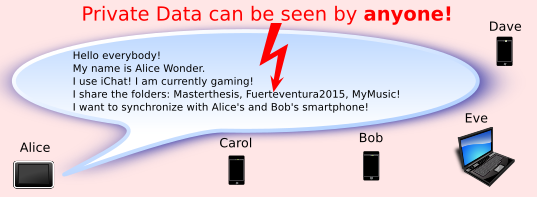
Abstract
Multicast DNS Service Discovery (mDNS-SD), made fashionable through Apple’s Bonjour, is a prevalent technique allowing service distribution and discovery in local networks without configuration (Zeroconf). Possible application areas are device synchronization, instant messaging, VoIP, file and screen sharing. It is very convenient for users, because they can connect to and offer services when they enter a network without any manual configuration. However, it requires the public exposure of the offering and requesting identities along with information about the offered and requested services, even when services do not need to be public. Some of the information published by the announcements can be very revealing, including complete lists of family members. In this paper we discuss the privacy problems arising when using mDNS-SD and present our privacy extension, which allows hiding all information published while still not requiring any network configuration except for an initial pairing. A key feature of our solution is the ease of upgrading existing systems, a must for widespread deployment and acceptance. To show the feasibility of our mDNS-SD privacy extension, we developed an implementation based on the open-source Avahi daemon.
BibTeX (Download)
@inproceedings{Kaiser2014Adding,
title = {Adding Privacy to Multicast DNS Service Discovery},
author = {Daniel Kaiser and Marcel Waldvogel},
url = {https://netfuture.ch/wp-content/uploads/2014/08/Kaiser2014Adding.pdf},
year = {2014},
date = {2014-09-24},
urldate = {1000-01-01},
booktitle = {Proceedings of IEEE TrustCom 2014 (IEEE EFINS 2014 workshop)},
abstract = {Multicast DNS Service Discovery (mDNS-SD), made fashionable through Apple’s \emph{Bonjour}, is a prevalent technique allowing service distribution and discovery in local networks without configuration (Zeroconf). Possible application areas are device synchronization, instant messaging, VoIP, file and screen sharing. It is very convenient for users, because they can connect to and offer services when they enter a network without any manual configuration. However, it requires the public exposure of the offering and requesting identities along with information about the offered and requested services, even when services do not need to be public. Some of the information published by the announcements can be very revealing, including complete lists of family members. In this paper we discuss the privacy problems arising when using mDNS-SD and present our privacy extension, which allows hiding all information published while still not requiring any network configuration except for an initial pairing. A key feature of our solution is the ease of upgrading existing systems, a must for widespread deployment and acceptance. To show the feasibility of our mDNS-SD privacy extension, we developed an implementation based on the open-source \emph{Avahi} daemon.},
keywords = {DNS-SD, Multicast, Peer-to-Peer, Privacy, Service Discovery, Social Networks, Trust, Zeroconf},
pubstate = {published},
tppubtype = {inproceedings}
}



